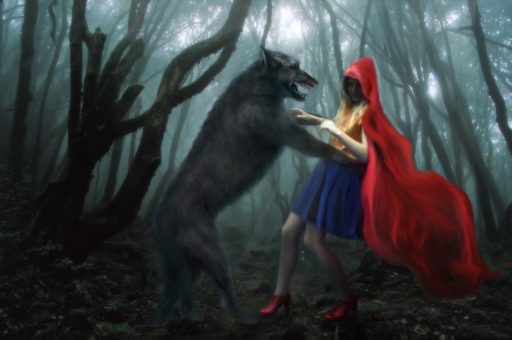My children are both at peak fairy tale age—four and two—so I have been studying up on the classics: Grimms, Andersen, MacDonald. But I’ve noticed something I never saw before: in fairy tales, the mother is almost always absent. Sometimes she’s dead, as in “Beauty and the Beast” or “The Little Mermaid”; sometimes there is a wicked stepmother like in “Cinderella” or “Hansel and Gretel.” But even when she is physically present, she’s often emotionally absent. She cannot keep up, as it were, with her children on their journey towards maturity, and that becomes key to the story.
Now, I’m convinced this is not some latent antifeminism; fairy tales regularly feature women of great power, for good or for ill. George MacDonald’s women are often more powerful and more active than his men. Lilith, the greatest fairy tale of all time, is an epic about the battle between the glorified feminine and the damned feminine. In The Uses of Enchantment, Bruno Bettelheim argues that fairy tales play a crucial role in psychological development. If he is correct, as I believe he is, the absence of mothers (not mother-figures or strong female characters, but the literal mothers who birth and feed and clothe) is deeply significant, and deeply difficult, both for children and for mothers.
As a mother, it’s difficult for me to realize that the time is coming when I will fail my children. I want to imagine that I will always be able to keep up with them and guide them through the challenges of growing up. But at some point, I’ll fall behind. This will hurt them, but it has to happen so they can grow up. As my husband says, “Parenting is working yourself out of the best job there is.”
These stories are difficult for me on another level too, though, and I suppose I’ve buried the lead here, because last week my own mother embarked on the Great Absence. She died. So I guess I’m at peak fairy tale age too, because I feel like a child again, looking out at a world where everything is strange, where some vital protection has been removed and anything might happen.
Bettelheim isn’t the only one to see psychological value in fairy tales. Robert Bly, Stephen Sondheim, and J.R.R. Tolkien did too. All of these writers recognized that these are not merely morality tales (though they deal extensively with morality). They are journeys into the psychic landscape of a child. They are excursions into the pre-adolescent imagination—an imagination that lingers in all of us—where ideas do not yet exist as concepts but only as characters, and emotions are not the content but rather the context of a story.
Emotions in fairy tales are not things that the characters feel; rather, they are the setting against which characters act. My son, when he is frustrated because it is time to go to bed, sometimes strikes the wall with his fist. He does not experience his frustration as an emotion. Instead, he feels it as a physical trap. He describes frustration as “I want to get away.” As he matures, this will change. He will learn to ride the emotion rather than be immersed in it. But particularly powerful emotions, like deep grief, can plunge us back into the sea.
That’s happened to me with my mother’s death. Right now, it is difficult to say that I “feel” anything; rather, the world makes sense only as a series of physical impressions. My hands and feet are often cold and shaky. My chest is tight and heavy. I cannot get a deep breath. My face spontaneously goes numb. Occasionally there is an identifiable emotion—sometimes I cry—but usually I’m just confused and overwhelmed, like a child wandering in a grey wood full of intermingled light and shadows. I struggle to make simple decisions, the same decisions that mark the turning points of fairy tales: to eat or not to eat? To walk or to sleep? To greet someone or to pass them by?
Fairy tales, I’m convinced, are all about the same thing. They exist to equip children for the two major changes we experience in our embodied lives: sex and death. I know; I hear the gratuitous Freudianism. But that doesn’t mean it’s not true. When I say “sex,” I don’t mean only the act of copulation. I mean the whole process of becoming aware of our bodies as desirable and potentially procreative and becoming mature enough to be happy and unafraid of our new powers. When I say “death,” I don’t mean just the moment of dying; I mean the whole process of our bodies breaking down, of losing mastery of our physical selves. These are the things fairy tales explore.
In “Little Red Riding Hood,” Little Red dies; she is consumed by the wolf and is, for all narrative purposes, dead. “Hansel and Gretel” hinges on the theme of unbridled bodily appetites leading to death. It does not take much imagination to see themes of burgeoning sexuality in “Little Red Riding Hood” and “Jack and the Beanstalk”: Jack’s magic seeds produce a great stalk that he must scale and eventually subdue, and Little Red’s crimson cap attracts the attention of a predatory male figure. (For more on this, see The Uses of Enchantment, where Bettelheim makes many of these observations and many more.)
With such weighty matters at stake, the failures of mothers play a key role. Little Red’s mother inadvertently causes her daughter’s death by failing to recognize that Little Red’s burgeoning appeal is bound to attract the dangerous attention of the wolf—even though the mother knows that her daughter is too naïve to deal appropriately with that attention. The mother sends her daughter into a situation that leads to her death (and, happily, her resurrection through the intervention of the hunter). Jack’s mother struggles to allow her son to grow up. She refuses to praise his ingenuity in trading the milk-less cow for the magic beans. This spurning of his manly initiative drives Jack to travel up the beanstalk a third time, even after he has provided for the family with the goose that lays golden eggs. He must put his own life at risk to prove his sexual maturity, which his mother has undermined. Both Little Red and Jack must undergo great trials to recover from their mothers’ failings, but those trials lead to their triumph.
Obviously we don’t say all this when we tell fairy tales. But there is great grace in a mother telling her children story after story about mothers failing their children—and the children carrying on regardless. My mother told me these stories, and now I tell my children, these odd menacing magical stories of children wandering alone through a world of terror and beauty, a world where the scantiest gift can spring up overnight as a tower to Paradise, where a wise risk can save a city and faithfulness to a vow can free us from the grimmest dungeon. These stories clear a path through the thorny world of growing up—a world in which even the most present mother must vanish bit by bit, just as my mother did, and just as one day I surely will too. And I, like all mothers before me, need to know that my children will be able to go on without me.
J.C. Scharl is a poet and essayist. Her work has appeared in the New Ohio Review, The Lamp, and Dappled Things, among many others.





